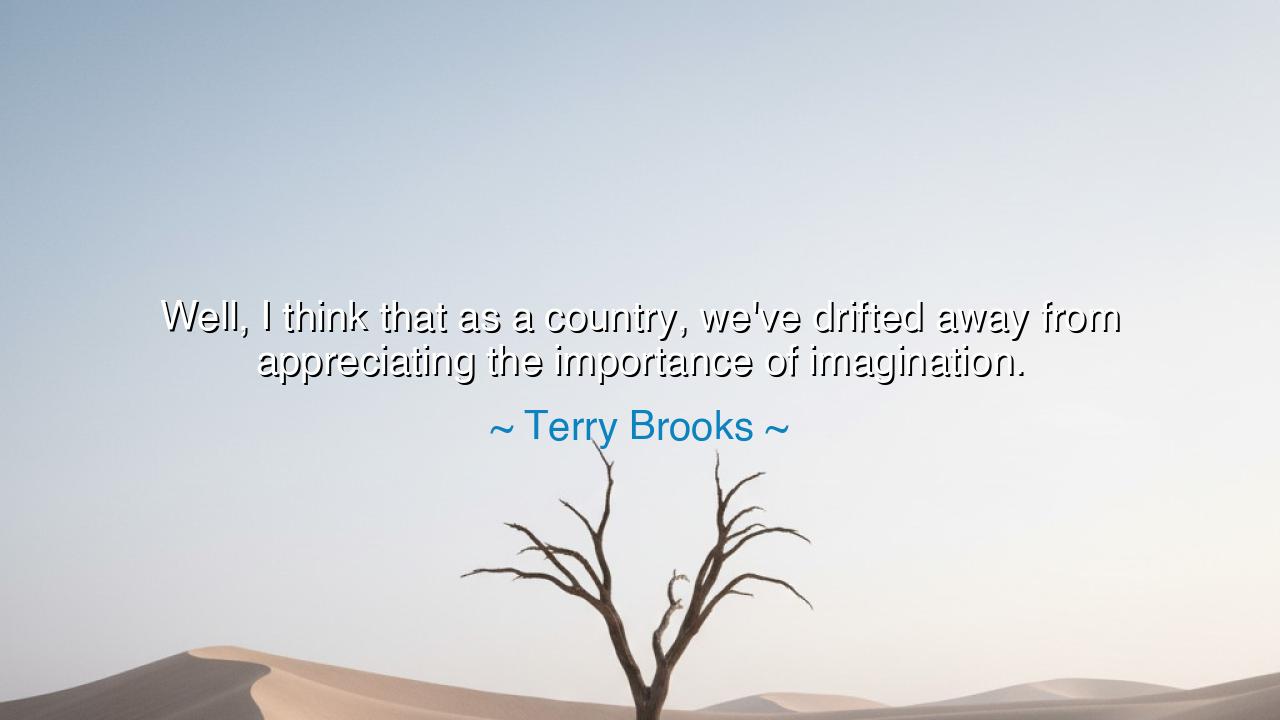
Well, I think that as a country, we've drifted away from
Well, I think that as a country, we've drifted away from appreciating the importance of imagination.






“Well, I think that as a country, we’ve drifted away from appreciating the importance of imagination.” Thus spoke Terry Brooks, the storyteller whose tales of magic and myth carried readers into worlds of wonder — yet whose warning rings not only for his homeland, but for all humankind. In these words lies both lament and prophecy: a lament for what has been forgotten, and a prophecy for what must be reclaimed. For when a people lose their imagination, they lose the very essence that makes them alive — their ability to dream beyond what is, to envision what might be, and to build the unseen into reality.
Brooks, known for his Shannara chronicles and other works of fantasy, came of age in an era where stories of wonder shaped the hearts of generations. He understood that imagination was not an escape from truth but a gateway to it — a bridge between the world of the seen and the world of the possible. Yet, as the modern age advanced, he watched with sorrow as society turned away from that sacred gift. A nation once guided by dreamers — poets, inventors, and visionaries — became consumed by immediacy, by machinery, by the measurable and the profitable. His words remind us that the drift from imagination is not merely cultural; it is spiritual. It is the slow forgetting of what makes the human soul luminous.
The origin of his quote lies in interviews and reflections where Brooks spoke of the changing nature of creativity in modern society. He saw that the young were taught facts but not wonder, efficiency but not curiosity. In a time when information is abundant, true imagination has become rare. We live surrounded by screens that entertain but seldom inspire, by systems that measure success but not meaning. Brooks, like an ancient seer, calls us back to the wellspring of human greatness — to the inner vision that precedes every work of art, every invention, every revolution of the spirit. For without imagination, no nation, no civilization, can endure beyond its comfort.
History offers proof of his warning. When the Renaissance dawned in Europe, it was not born of wealth or power, but of renewed imagination — the courage to see beyond the limits of the known world. Painters like Leonardo da Vinci, poets like Dante, scientists like Copernicus — all were guided by vision, by that divine spark that refuses to accept the world as it is. Yet when empires grow proud and complacent, they turn their gaze inward, worshiping reason and utility while neglecting the imagination that gave them birth. Thus, they decay, not from weakness, but from forgetfulness. Brooks saw this same forgetting in his own time — a nation drifting, not from lack of power, but from loss of wonder.
He reminds us that imagination is not the opposite of reality — it is its architect. Every great achievement begins as a dream in someone’s mind. The first flight of the Wright Brothers, the poetry of Whitman, the freedom envisioned by the founders of nations — all were born in the crucible of imagination. Without it, society becomes mechanical, efficient but soulless, prosperous but blind. When imagination fades, the future itself fades, for there can be no progress without vision, and no vision without wonder.
And yet, there is hope. For the imagination cannot truly die — it only slumbers, waiting for the brave to awaken it. Brooks’s words are a call to arms for all dreamers, artists, teachers, and thinkers: rekindle the fire. Let parents tell stories again. Let schools teach not only what is, but what could be. Let leaders remember that the destiny of a people is written first in the imagination of its children. A country that honors imagination will forever renew itself, for it will always have the courage to dream anew.
So take this lesson, O seeker of truth: guard the flame of imagination within you as a sacred trust. Do not allow cynicism or comfort to dim it. Read deeply, dream boldly, question freely, and dare to create what the world has not yet seen. For the decline of imagination is the decline of the soul — and its revival is the rebirth of nations.
Thus, let Terry Brooks’s wisdom echo across the ages: when a people honor their imagination, they remain forever young, forever creative, forever alive. But when they drift from it, they lose not only their stories — they lose themselves. Therefore, live as one who remembers the power of dreaming, for it is through imagination that the future is shaped, and through its light that humanity finds its way home.






AAdministratorAdministrator
Welcome, honored guests. Please leave a comment, we will respond soon